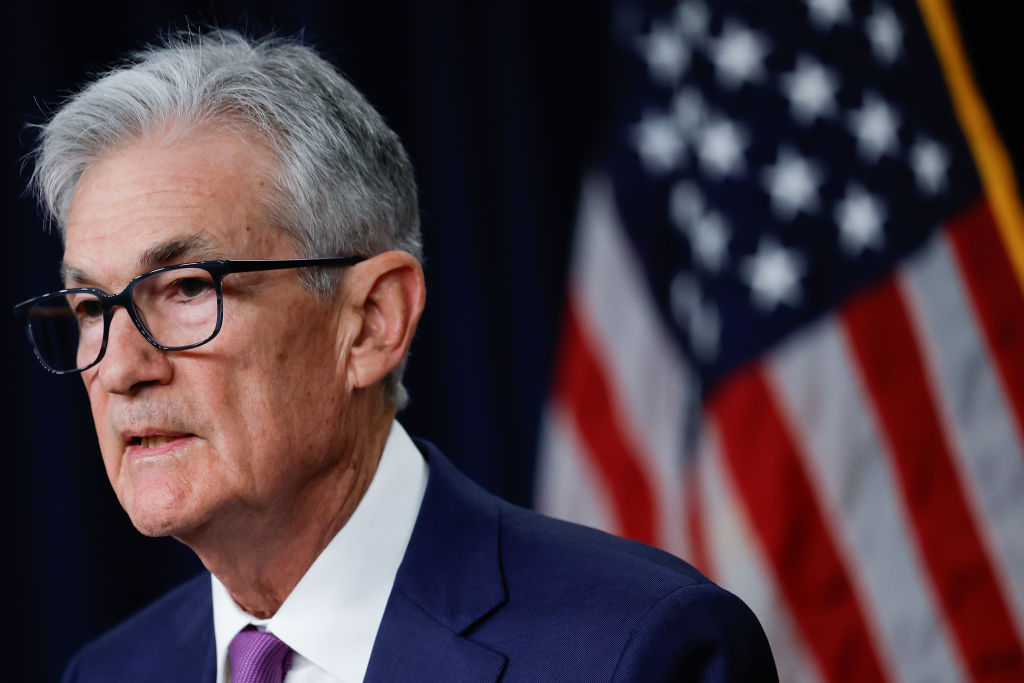
Federal Reserve Chair Jerome Powell's mid-morning speech at the Jackson Hole Economic Symposium lit a fire under stocks Friday. Indeed, the main indexes hit their session highs shortly after the Fed chief wrapped up his dovish address. And while equities pulled back a bit as the session wore on, they still finished the day and week with notable gains.
"The time has come for policy to adjust," Powell said this morning at the Kansas City Fed's annual central bank event in Jackson Hole, Wyoming. "The direction of travel is clear, and the timing and pace of rate cuts will depend on incoming data, the evolving outlook, and the balance of risks."
Despite Powell's views on the potential for future adjustments, "rate markets have not decisively moved to firmly price in either a 25 basis-point (0.25%) or a 50 basis-point (0.50%) adjustment for September, remaining somewhere in the middle of that range," says Dan Siluk, head of global short duration and liquidity at Janus Henderson Investors.
Per CME Group's FedWatch Tool, futures traders are pricing in a 63.5% chance the Fed will cut interest rates by a quarter-percentage point in September. Odds are 36.5% that it'll be by a half-percentage point.
The head of the central bank also said that the Fed will not welcome "further cooling in labor market conditions." This shift in focus toward employment and away from inflation "indicates that future interest rate volatility may be more closely tied to labor market data," Siluk adds.
It also makes the next jobs report on September 6 a key event Wall Street will be waiting for.
Cava soars after beat-and-raise quarter
In single-stock news, Cava Group (CAVA) surged 19.6% after the Mediterranean-style fast-casual restaurant chain posted a beat-and-raise quarter. The results also showed traffic was up 9.5% while same-restaurant sales grew 14.4%.
This positive earnings reaction had several analysts raising their price targets on the consumer discretionary stock, including CFRA Research analyst Siye Desta, to $125 from $85. CAVA closed today at $122.00.
However, Desta maintained a Hold rating, saying that while he's optimistic about the company's growth prospects, "with shares now trading at their highest valuation since going public and up nearly 200% year to date, we're leaning toward caution."
Workday boosts long-term targets
Workday (WDAY) was also moving on earnings, jumping 12.5% after the cloud-based HR software provider disclosed strong fiscal Q4 earnings and lifted its long-term forecasts for annual subscription revenue growth and operating margin.
The increased margin forecast could signal a risk of underinvestment in long-term opportunity, says BofA Securities analyst Brad Sills (Buy). Still, he believes "there is potential for a pivot back to growth over time via innovation in AI-enabled features and go-to-market leverage from a reprioritized system integrator channel."
Intuit hikes dividend by 16%
Elsewhere, Intuit (INTU) fell 6.8% after earnings. While the TurboTax parent reported higher-than-expected fiscal fourth-quarter results, a downwardly revised long-term growth forecast for its consumer segment "likely led to some disappointment," says William Blair analyst Arjun Bhatia (Outperform, the equivalent of a Buy).
But Bhatia isn't worried. He believes the revision is "more reflective of the current macro environment," and he continues to have "a positive long-term outlook on Intuit."
Also included in Intuit's earnings report was news of a 16% increase in its quarterly dividend. INTU is one of the best dividend stocks for dependable dividend growth, having increased its payout for 12 straight years.
As for the main indexes, the Dow Jones Industrial Average rose 1.1% to 41,175, the S&P 500 added 1.2% to 5,634, and the Nasdaq Composite gained 1.5% to 17,877.
Nvidia earnings, PCE data on deck
The final week of August offers plenty of opportunity for fireworks in the stock market. For starters is Nvidia (NVDA, +4.6%) earnings, due out after Wednesday's close.
Meanwhile, Friday's release of the July Personal Consumption and Expenditures (PCE) Index headlines a fairly busy economic calendar. The data, which measure consumer spending, are the Fed's favorite measure of inflation.







